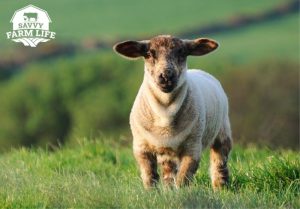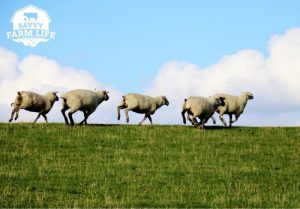
What Scares Sheep?
Most people – even those without sheep experience – know that sheep can be timid and easily-spooked animals. Is this reputation fairly earned? Are there specific things that sheep are more afraid of than others?
What are sheep afraid of? Sheep are afraid of unexpected or loud noises, dark or shadowed spaces, and anything that resembles a predator or threat. They are also timid to leave their flock as the flock offers a level of security and protection.
Sheep are prey animals, so they are easily frightened. Not only are they quick to spook, but they are also sensitive to stress and fear, and repeated or chronic stress can be harmful to your sheep’s health. Is there anything you can do to help you sheep overcome its fear? Read on to learn more!
Sheep Are Afraid of Solitude
Sheep are prey animals, with few natural defenses. Because of their limited ability to defend themselves, they rely heavily on the safety of the flock for survival. The flock is the sheep’s greatest defense. Many people think that the sheep’s innate need to flock is evidence that they are not smart animals. Just how intelligent sheep are is a subject that requires more research (check out my article How Smart Are Sheep? The Answer Will Surprise You.) – but the flocking behavior is far from evidence of a lacking intelligence. Flocking is the sheep’s greatest chance at survival, and they know that there is safety in numbers.
So what happens when you remove a prey animal’s greatest defense? When you separate a sheep from the safety of his flock, you will cause great stress and fear in the animal. The isolated sheep will feel especially vulnerable. He will pace, will show signs of agitation, and will call out for his flock.
How To Keep Isolated Sheep Calm
Unfortunately, there are times when we must separate a sheep from his flock. This may be necessary to treat an injury, to quarantine during an illness, or simply to perform maintenance like shearing or feet trimming. Is there anything you can do to limit the stress that this will put on the animal?
The stress of isolation will be reduced by having other members of the flock in the isolated sheep’s line of sight. Simply by allowing the isolated sheep to see other flock members can calm the sheep and lessen the effect the fear has. If you have to isolate one sheep, try to keep it in view of the flock as much as possible. If she needs to be separated for safety reasons, it would be helpful to have a pen adjacent to the rest of the flock so that the visual connection between the flock members is maintained. If you perform your shearing or feet trimming in the barn, try to bring two or three sheep in at a time, so that they do not feel isolated.
Sheep Are Afraid Of Predators
It may seem obvious that sheep are afraid of predators, but we must keep in mind that a sheep does not always know how to distinguish between a predator and a person or animal that may appear to be a predator.
One of the most common threats to sheep are coyotes. But how are sheep to tell the difference between a coyote and the neighbor’s loose dog, or your new puppy? You cannot reason with a sheep on these matters – if a person or animal even remotely resembles a predator, it will scare your sheep.
How To Lessen Fear Of Predators
One way to limit the stress that fear of predators can cause is to protect your sheep from predators. If coyotes have occasionally broken into your sheep pen and caused destruction within the flock, your sheep will feel a heightened level of stress. Do your best to ensure that your sheep are as safe as possible, using proper fencing (including electric fencing), and other safety measures.
You will also want to limit the number of dogs and other large animals (domesticated and otherwise) that are present on your property. For example, if you are dog-sitting a friend’s dog, keep the dog away from your flock. The dog may be safe and may not attempt to chase your sheep, but that does not mean the sheep will feel safe.
Another thing you can try if you have lambs is to introduce lambs early on to a friendly dog. If the lambs can learn that your dog isn’t a predator, they won’t be afraid of it when they grow up. This is also true for getting sheep to trust humans. If a lamb is raised closely by humans, they tend to be much more accepting of human contact.
What About Livestock Guardian Dogs?
Livestock guardian dogs are an effective predator control. But if your sheep are afraid of dogs and large animals, how will they react to having a 150-pound Great Pyrenees in the pasture with them?
There is a reason immersion therapy can be successful in eliminating fear – continued exposure to a phobia will lessen the fear response. Sheep are smart animals and with time and patience, will be able to tell the difference between your calm, protective LGD and a true threat.
To learn more about livestock guardian animals, visit my article What Are the Best Livestock Guardian Animals?
Sheep Are Afraid Of Loud Noises
 Sheep have an excellent sense of hearing, and in fact can amplify sounds through their ears and pinpoint where a particular sound is coming from. Because of this excellent sense of hearing, they are particularly sensitive to loud or unexpected sounds.
Sheep have an excellent sense of hearing, and in fact can amplify sounds through their ears and pinpoint where a particular sound is coming from. Because of this excellent sense of hearing, they are particularly sensitive to loud or unexpected sounds.
What kinds of loud noises are sheep afraid of? All of them, really. Barking dogs, loud car or motorcycle engines, a yelling child, or power tools. If your neighbor has a loud muscle car, or you have a rooster next to the sheep pen, don’t fret. Sheep can become accustomed to loud noises that they hear often. They are particularly fearful of unexpected loud noises.
How To Limit Stress Caused By Loud Noises
When working with your sheep, you should take care to limit sudden loud noises. If you need your sheep to move into the barn, avoid yelling at them. Speak to them calmly and use the least amount of noise necessary to get them to move. How do you know how much noise is needed to get them to move? Start low and only elevate your voice as needed.
If you can, avoid other loud noises that are within your control. If you have children, don’t let them run and scream when they are around the sheep. If one of your neighbors has dogs that bark excessively, consider keeping the sheep on the other side of the property if possible. If making repairs to the barn or fences, consider using power tools off site when possible.
Sheep Are Afraid Of Shadows
Sheep have excellent peripheral vision – with their rectangular pupils and eye location, they have a field of vision of up to 300 degrees, depending on how much facial wool growth there is. While a sheep’s field of vision is to be envied, their depth perception is lacking. Because of this deficit, sheep will usually be wary when it comes to shadows, dark spaces, and contrasts between light and dark.
You may find your sheep unwilling to enter the barn if it is particularly sunny outside and dim inside. Your sheep may also be unwilling to cross a shaded section of the pasture or enter a shadowed outdoor shelter.
How To Help When Your Sheep Are Afraid Of The Shadows
If your sheep is inexplicably unwilling to enter a space or go in a specific direction, look at the lighting. Is the area you are pushing your sheep toward dark or shadowed? Is it dim compared to the bright sky around it? Your sheep may simply be afraid to move in that direction because they are unsure of what may lurk in the shadows.
If this is the case, be patient and understanding of your sheep’s limitations. Carry a flashlight with you if you must, or consider installing a light in the barn or other commonly dim area in your sheep’s pen. You may also enter the area first, showing your sheep that you are safe and there is nothing scary. Of course, you may also try enticing your sheep into the dark with treats. It’s surprising what you may be able to get your sheep to do for an apple slice or a baby carrot.
What Happens When A Sheep Is Afraid?
Sheep are particularly sensitive to fear and stress. Sheep that are afraid have a tendency to panic. A panicked sheep will become difficult or impossible to manage until she has calmed down. Fear will initiate the “fight or flight” response, and in a sheep that has no real fighting tactics, flight will become the means of survival. Panicked sheep often flee, and little can get them to calm down and cooperate with you until the source of their fear has been removed and they have had time to recover on their own.
When a sheep is afraid, her respiration and heart rate will increase. She will become beside herself with fear, and may trample more vulnerable sheep in her attempt to escape – sometimes to death. A pregnant ewe who is afraid or under stress is also at risk of miscarriage.
Because of the harm that prolonged stress and fear can cause in your sheep, it is best to do what you can to limit stress.
Sheep Are Fearful Animals
While there are steps outlined above that can help you limit the stress that your sheep experience, it is impossible to anticipate and prevent everything that can strike fear in your sheep. Be patient and understanding with them, do what you can to eliminate threatening sounds and sights, and your sheep will be happy.
How do sheep protect themselves from things they are afraid of? To get your answer, visit my article How Do Sheep Protect Themselves? Essential Guide.
